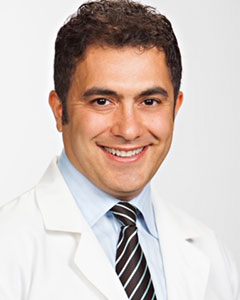Ask a Question, Get an Answer from leading local Doctors & Experts - 100% Free!
What Kind of Question Do You Have? It’s Easy. Ask Now!
Ask a Top Doctor Ask a Fitness/Image Expert Ask a Therapist BrowseRecently Asked Questions
TMJ

There is a long list of different reasons that can cause TMJ pain. Sometime the problem ccan present themselves as TMJ pain but it has nothing to do with TMJ. We have to go down the list and try to eliminate each cause. One of which is malocclusion which in turn can cause clenching and then... [read more]
There is a long list of different reasons that can cause TMJ pain. Sometime the problem ccan present themselves as TMJ pain but it has nothing to do with TMJ. We have to go down the list and try to eliminate each cause. One of which is malocclusion which in turn can cause clenching and then TMJ pain. To eliminate this cause sometimes bite adjustment and a bite splint can help. Medications such as muscle relaxants and placing a warm pack on facial muscles can also be helpful. In the event the these are done and patient still experiences TMJ pain, we have to look into patients posture and head, neck and back muscles. There are physical therapists that specialize in this matter. In regards to biting tongue, I believe a dentist needs to look at patient’s teeth position and see the height of the inside cusps of the back teeth. We need more dental history to find out the reason behind tongue biting but tongue biting is not related to TMJ pain.
Arash Asil, DMDVeneers

Thank you for taking the time to ask a great question. In fact, you’re not alone. The most common request we get from patients who come in to see us for the first time is the desire to restore their smile to a youthful and healthy appearance. You’re absolutely right! It is the... [read more]
Thank you for taking the time to ask a great question. In fact, you’re not alone. The most common request we get from patients who come in to see us for the first time is the desire to restore their smile to a youthful and healthy appearance. You’re absolutely right! It is the natural “wear-and-tear” on our teeth over the years that cause them to change in ways that leave us feeling less inspired to smile for the camera.
The good news is, at Newport Center Dental we use the latest techniques and materials that can restore any smile and give you the most natural appearance. While pictures and the use of digital images can sometimes be helpful, they are limited in how we are able to demonstrate all that is possible. Generally, those images are similar to the ones that can easily be created using any photoshop program. Your face, your smile and the function of your teeth is so much more than that -- which is why we preview a new smile by creating a mock-up of how your new smile will actually look AND feel. It is so lifelike and beautiful that patient’s often want to go home wearing their initial mock-up.
The best way to provide you with a clear picture of what’s possible is to invite you to meet our team, share your goals for your new smile and discuss all the options available to you. This could be exactly what you’ve been waiting for and we believe you deserve it! Visit our site and feel free to call for your Complimentary New Smile Consultation today.
Dr. McHarris and the Newport Center Dental Team
Veneers

Your concern is a very common concern and I don't advise my patients to "sand down" their teeth as the first option to correct their smile. Because I haven't seen you, I can't tell you how much tooth structure you would have to adjust to fit nice looking veneers or whether or not you would... [read more]
Your concern is a very common concern and I don't advise my patients to "sand down" their teeth as the first option to correct their smile. Because I haven't seen you, I can't tell you how much tooth structure you would have to adjust to fit nice looking veneers or whether or not you would need to take down any tooth structure at all! (There are such things as no-prep veneers that are great for the right candidate). That being said, usually when veneers are done, you can get what is called a "wax up" which will show you what your teeth will look like with veneers before you even have to make a decision. You can see what you're teeth will look like in advance and decided whether or not you want to move forward with veneers before doing anything permanent to your teeth!
Ask your dentist about the possibility of no-prep veneers or a wax up to help you make informed decisions. Keep in mind, there are pros and cons to each treatment and make sure you ask about those as well.
Hope this helps you Casey!
Sincerely,
Dr Tammy Tran
Smile Makeover
I have a little too much gums showing, a slight gap between my front teeth and teeth that are a little too small. Is Veneers the best option? I would also like whiter teeth and am wondering how to match that color with the bottom teeth.
Monica, Anaheim
Hi Monica, When you have gap between teeth, veneers are certainly an option. However, you can also do braces to close gap between teeth. It is best that you see a dentist to evaluate which option is better for you. If you want, you can send me a picture of your close up smile, so I can have a better... [read more]
Hi Monica, When you have gap between teeth, veneers are certainly an option. However, you can also do braces to close gap between teeth. It is best that you see a dentist to evaluate which option is better for you. If you want, you can send me a picture of your close up smile, so I can have a better idea to advise you.
Best,Dr. Lai
TMJ
Breelynn A. Newport Beach, CA

Unfortunately, TMJ symptoms are very common but fortunately, they rarely require surgery to correct. The majority of cases will spontaneously resolve over time, and only a few will require medical attention. Most of the time the cause is a malocclusion (“bite getting out of alignment”) where... [read more]
Unfortunately, TMJ symptoms are very common but fortunately, they rarely require surgery to correct. The majority of cases will spontaneously resolve over time, and only a few will require medical attention. Most of the time the cause is a malocclusion (“bite getting out of alignment”) where some minor occlusal interferences will lead to joint pain, joint noises and muscle pain. The treatment is usually an occlusal adjustment. This is easily performed by a knowledgeable general dentist, prosthodontist or even an orthodontist. Once the bite has been adjusted, the patients often require a night guard to keep the TMJ healthy and maybe some physical therapy to help resolve any residual symptoms. An oral surgeon is only involved in the severe cases that do not respond to conservative therapy.
There is no specialty in dentistry involving the TMJ but there are many dentists in the area who focus their practices on patients with TMJ symptoms. These dentists have a lot of experience and some very sophisticated ways of diagnosing and treating TMJ problems. It is always best to start with non-surgical treatment options and proceed from there.
>br> Thomas R. Michaelis, DDS, MDDiabetic and Can't Feel Feet?

Numbness and loss of sensation in the feet is never normal. One of the most common causes of loss of sensation is diabetic neuropathy. This is a type of “nerve damage”, which can occur secondary to high blood sugar, as seen in diabetes. The nerves of the feet are most frequently... [read more]
Numbness and loss of sensation in the feet is never normal. One of the most common causes of loss of sensation is diabetic neuropathy. This is a type of “nerve damage”, which can occur secondary to high blood sugar, as seen in diabetes. The nerves of the feet are most frequently affected, but progression to the hands is also not uncommon. Symptoms can range from mild, non-painful numbness to painful burning sensations. While common, diabetic neuropathy can be prevented or slowed with better blood glucose control, appropriate diet, and healthy activities.
Loss of sensation to the feet does increase the risk of open wounds, infection, and possibly amputation. Daily self foot examinations, avoidance of barefoot walking, appropriate shoes, and prompt evaluation of any changes to the lower extremities is important to prevent complications. Evaluation and assessment by a podiatrist has been showed to decrease risks of complication in diabetic patients.
Dr. Michael Coyer, DPM, AACFASDiabetes
Johanna H. Lake Forest, CA

Type 2 diabetes is an inherited disease: having a family member with type 2 diabetes tremendously increase the risk of individual developing type 2 diabetes by 30 to 70% but obviously does not guarantee having it.
The person at risk because of family genetics also has both... [read more]
Type 2 diabetes is an inherited disease: having a family member with type 2 diabetes tremendously increase the risk of individual developing type 2 diabetes by 30 to 70% but obviously does not guarantee having it.
The person at risk because of family genetics also has both the increased risk of becoming overweight/obese and with a greater susceptibility to the negative consequences of increasing body fat, probably as a consequence of an increased propensity to accumulate ectopic (nonsubcutaneous) fat (fat located and stored in the abdomen or liver). Fat deposits in this area increase inflammation throughout the body.
There are interventions that a person with this risk can take to limit or prevent both the obesity and diabetes risk and it involves thwarting the bodies over production of insulin. High insulin occurs because of “insulin resistance” and while it keeps blood sugars normal it causes carbohydrates to be stored as fat especially in the belly. This goes back to our earliest existence when it was a good thing to store food during times it was available to survive through times when it was not.
Being active as your son is important but so is limiting the total amount of carbohydrates to no more than 30 grams total carbohydrate per meal and 110 grams per day. The Ohio State University showed in a study published in Nature that this is the most important dietary intervention to encourage the burning of fat and the delivery of oxygen to muscle and limit the inflammation. If this is not sufficient medications that lower the effect of the excess insulin are available and used in addition to treat the associated lack of sense of fullness that accompanies this disorder.
Alan O. Marcus, MD, FACP, FACE
A1C Levels High and Diabetes Only Getting Worse

Sincerely,
Sean Nikravan, MD, FACE
Heel Pain

Heel pain is one of the most common foot problems we see in the office. Heel pain otherwise known as plantar fasciitis is inflammation of a ligament that is attached to the heel bone and becomes thick and irritated with repetitive trauma. Even though surgery is one way to address the... [read more]
Heel pain is one of the most common foot problems we see in the office. Heel pain otherwise known as plantar fasciitis is inflammation of a ligament that is attached to the heel bone and becomes thick and irritated with repetitive trauma. Even though surgery is one way to address the problem, it is rarely used and there are many other options to treat this issue. Treatment options include injection therapy with steroids and biologics, physical therapy modalities, and custom inserts and devices to fit inside your shoes for long term treatment. It is best to see a foot specialist, a podiatrist, to get a confirmed diagnosis so that a proper treatment plan can implemented.
Dr. Bathaee
Guest Writer
LASIK

I completely understand your husband’s hesitation. Our eyes are so important and our vision is so valuable for our everyday functioning – so considering any eye surgery can be scary and needs to be taken seriously! I have good news for your husband - LASIK has undergone tremendous... [read more]
I completely understand your husband’s hesitation. Our eyes are so important and our vision is so valuable for our everyday functioning – so considering any eye surgery can be scary and needs to be taken seriously! I have good news for your husband - LASIK has undergone tremendous evolution since its inception and our current LASIK technology is truly life-changing. The lasers that we use now are incredibly precise and offer personalized treatments for nearsightedness, farsightedness, and astigmatism.
LASIK—short for Laser-Assisted-In-Situ Keratomileusis—is the most commonly performed laser eye procedure in the world. It’s one of the safest and most effective ways to correct vision. My first piece of advice would be to seek a thorough consultation. During the consultation, we evaluate the overall eye health, your medical history and medications. We also perform extensive testing that helps us determine your candidacy for LASIK. The procedure itself is painless and takes less than 15 minutes. The recovery is very fast and most patients see 20/20 the next morning and can drive themselves to their follow up appointment without their glasses! So for your husband, who hates glasses and won’t wear contacts, LASIK might be a great option and I would definitely recommend a consultation to ensure he is a good candidate.
Duna Raoof, MD





